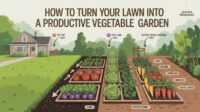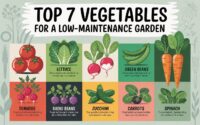How to Grow Vegetables Without Pesticides: Natural Pest Control Tips
Published: 2025-10-19
Introduction
Growing vegetables without pesticides is more than a trend. It is a commitment to health, sustainability and soil integrity. In America and beyond, gardeners are shifting toward natural pest control methods. This movement is driven by concerns over chemical residues, pollinator decline and environmental damage.
Moreover, pesticide-free gardening supports biodiversity. Beneficial insects, birds and microbes thrive in chemical-free environments. Soil structure improves and water contamination is reduced. Because vegetables are grown organically, they are safer to consume and more nutritious.
Whether you are a beginner or an experienced gardener, learning how to manage pests naturally is essential. This guide will walk you through proven techniques that protect your crops without harming the ecosystem.
Understanding Common Garden Pests
Before applying natural pest control, it is important to identify the enemy. Common vegetable garden pests include aphids, caterpillars, beetles and slugs. These insects feed on leaves, stems and roots, weakening plants and reducing yield.
Aphids are tiny sap-sucking insects. They cluster on new growth and excrete sticky honeydew. Caterpillars chew through foliage and bore into fruits. Beetles like the Colorado potato beetle destroy entire crops if left unchecked. Slugs and snails feed at night and leave slimy trails.
Because each pest behaves differently, targeted control is required. Observation and early detection are key. By knowing what to look for, gardeners can act before damage becomes severe.
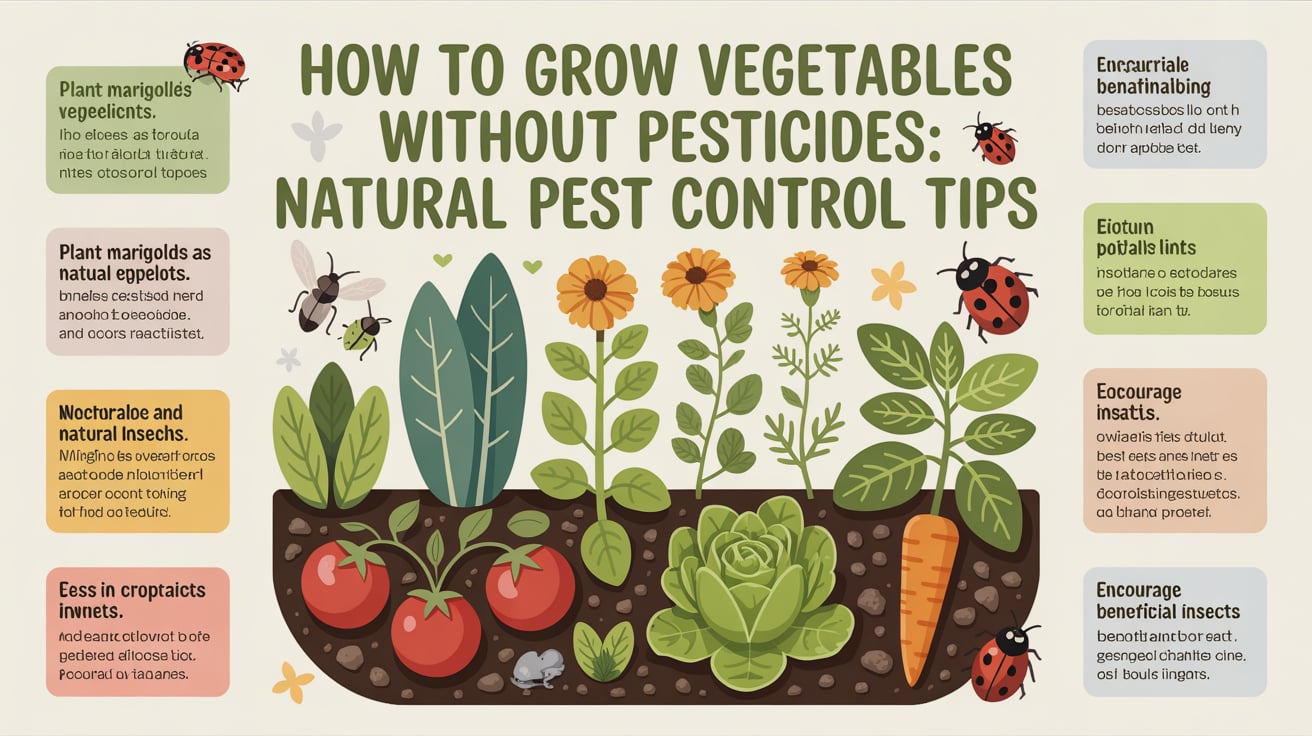
Beneficial Insects: Nature’s Pest Control Agents
Not all insects are harmful. Ladybugs, lacewings and parasitic wasps are natural predators. They feed on aphids, mites and caterpillars. By attracting these allies, pest populations are reduced naturally.
Ladybugs consume hundreds of aphids daily. Lacewing larvae are known as “aphid lions” due to their voracious appetite. Parasitic wasps lay eggs inside caterpillars, neutralizing them from within.
To attract beneficial insects, plant nectar-rich flowers like dill, fennel and yarrow. Avoid broad-spectrum insecticides that kill both pests and predators. With the right habitat, nature will balance itself. |
Companion Planting for Pest Prevention
Companion planting is a strategic method that uses plant relationships to deter pests. Certain vegetables and herbs repel insects or mask the scent of vulnerable crops.
For example, basil repels thrips and improves tomato growth. Marigolds deter nematodes and attract pollinators. Nasturtiums lure aphids away from other plants. Garlic and onions repel beetles and caterpillars.
By interplanting these companions, pest pressure is reduced. Additionally, biodiversity increases and soil health improves. This method is simple yet powerful.
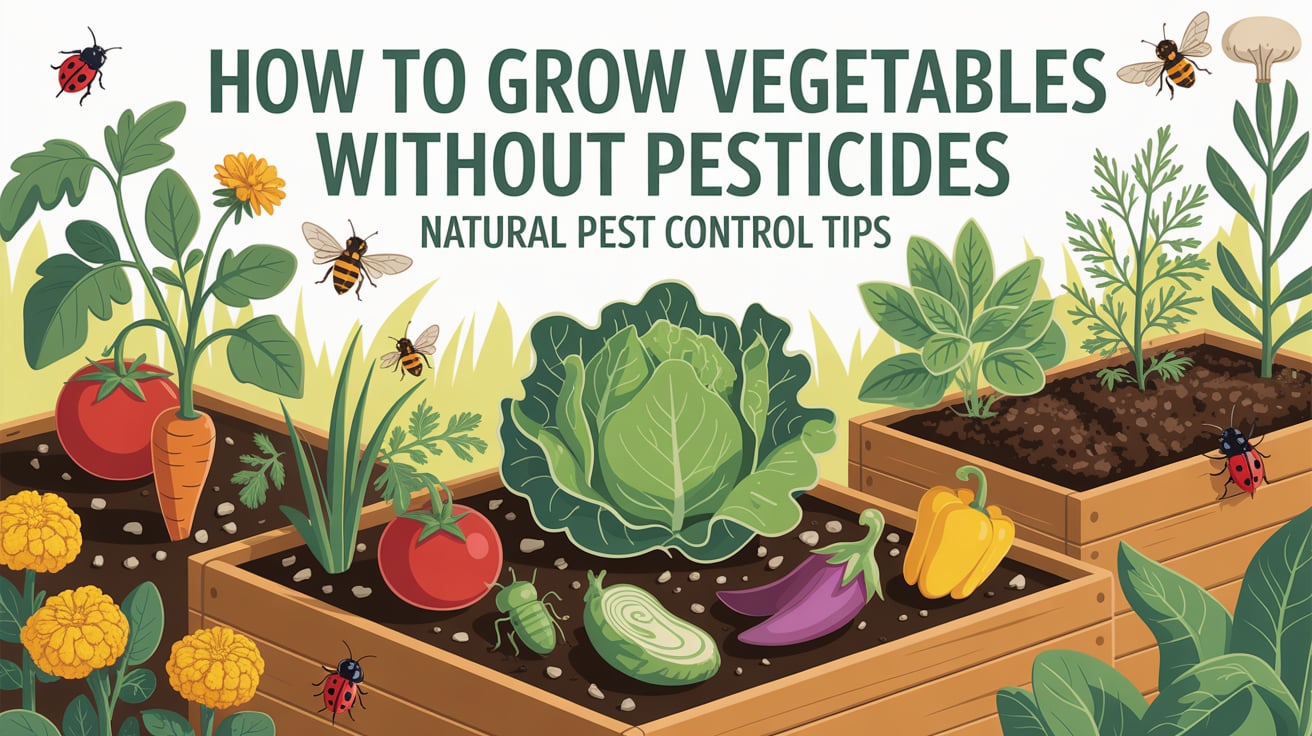
Homemade Natural Sprays and Repellents
Natural sprays offer direct pest control without chemicals. These solutions are made from household ingredients and are safe for plants and soil.
Neem oil is a popular choice. It disrupts insect feeding and reproduction. Mix with water and apply weekly. Garlic spray repels beetles and aphids. Blend garlic cloves with water and strain before use.
Soap spray suffocates soft-bodied insects. Use mild liquid soap and avoid detergents. Chili pepper spray deters chewing pests. Combine with water and apply to leaves.
These sprays should be used in the early morning or evening. Avoid spraying during hot sun to prevent leaf burn. Regular application ensures effectiveness.
Physical barriers prevent pests from reaching plants. Row covers, netting and collars are effective tools. They create a shield without chemicals.
Row covers protect seedlings from beetles and caterpillars. Netting keeps birds and larger insects away. Collars around stems deter cutworms and slugs.
Raised beds and trellises also help. They improve airflow and reduce soil contact. This minimizes fungal infections and pest hiding spots.
Because these methods are mechanical, they are safe and reusable. They suit organic gardening and reduce labor over time.
Water Management and Soil Health
Healthy soil and proper watering reduce pest outbreaks. Overwatering creates damp conditions that attract slugs and fungal diseases. Underwatering weakens plants and makes them vulnerable.
Compost improves soil structure and fertility. It supports beneficial microbes that suppress pathogens. Mulching retains moisture and prevents weed growth.
Drip irrigation delivers water directly to roots. This reduces leaf wetness and disease risk. By managing water wisely, plant resilience is increased.
Moreover, rotating crops prevents pest buildup. Different plants disrupt insect life cycles and reduce soil fatigue.
Selecting Pest-Resistant Vegetable Varieties
Some vegetables are naturally resistant to pests. Choosing these varieties simplifies pest management. Seed catalogs often list resistance traits.
For example, ‘Celebrity’ tomatoes resist nematodes and fusarium wilt. ‘Blue Lake’ beans tolerate beetles. ‘Snowball’ cauliflower resists aphids and cabbage worms.
Heirloom varieties may be more vulnerable but offer flavor and diversity. Hybrid varieties combine resistance with productivity. By selecting wisely, gardeners reduce the need for intervention.
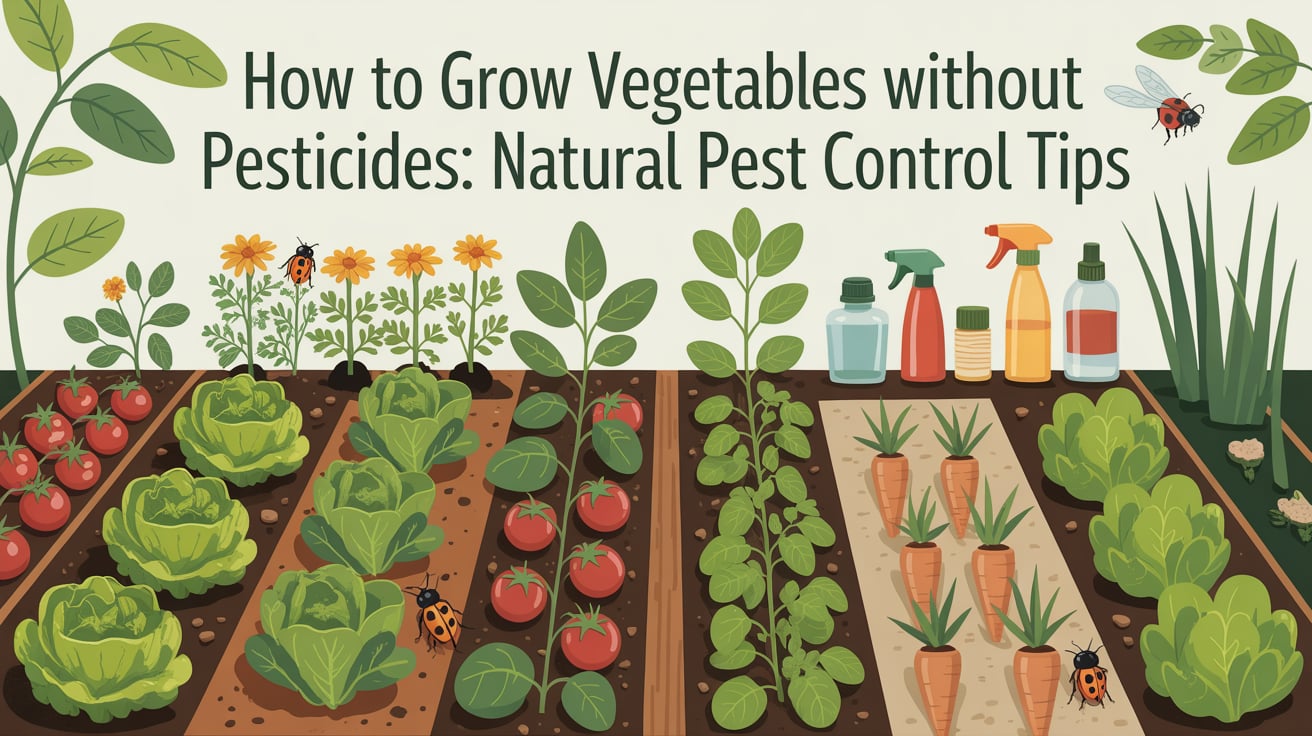
Monitoring and Early Intervention
Regular monitoring is essential. Walk through the garden daily and inspect leaves, stems and soil. Look for holes, discoloration or insect clusters.
Sticky traps help detect flying pests. Yellow cards attract aphids and whiteflies. Handpicking is effective for larger insects like beetles and caterpillars.
Early intervention prevents outbreaks. Remove affected leaves and isolate infected plants. Use natural sprays or introduce predators promptly.
Record observations in a garden journal. This helps track patterns and plan future strategies.
Harvesting and Post-Harvest Hygiene
Clean harvesting reduces pest attraction. Remove overripe fruits and fallen leaves. These materials harbor insects and disease.
After harvest, sanitize tools and containers. Compost plant debris properly. Avoid leaving residues that attract pests.
Store vegetables in cool dry places. Inspect for signs of infestation. Proper handling ensures food safety and garden health.
Seasonal Pest Control Strategies
Pest pressure varies by season. Spring brings aphids and flea beetles. Summer sees caterpillars and mites. Fall attracts slugs and rodents.
Adjust strategies accordingly. Use row covers in spring and mulch in summer. Plant trap crops in fall to lure pests away.
Winter is ideal for soil preparation and tool maintenance. Clean beds and plan crop rotation. Seasonal awareness improves results.
Eco-Friendly Gardening and Long-Term Impact
Natural pest control supports eco-friendly gardening. It reduces chemical runoff and protects pollinators. Soil life thrives and biodiversity increases.
Moreover, pesticide-free gardens are safer for children and pets. They align with organic certification and sustainable living.
Long-term impact includes healthier food, cleaner water and resilient ecosystems. Gardening becomes a force for good.
FAQs: Quick Answers About Natural Pest Control
Yes natural methods like companion planting and neem spray are effective.
Neem oil and garlic spray work well against aphids.
Plant flowers like dill fennel and yarrow to provide nectar.
Yes if made with natural ingredients and applied correctly.
Tomatoes beans and cauliflower have pest-resistant varieties.
Daily monitoring helps catch problems early and prevent damage.
Absolutely it is simple safe and effective with basic knowledge.
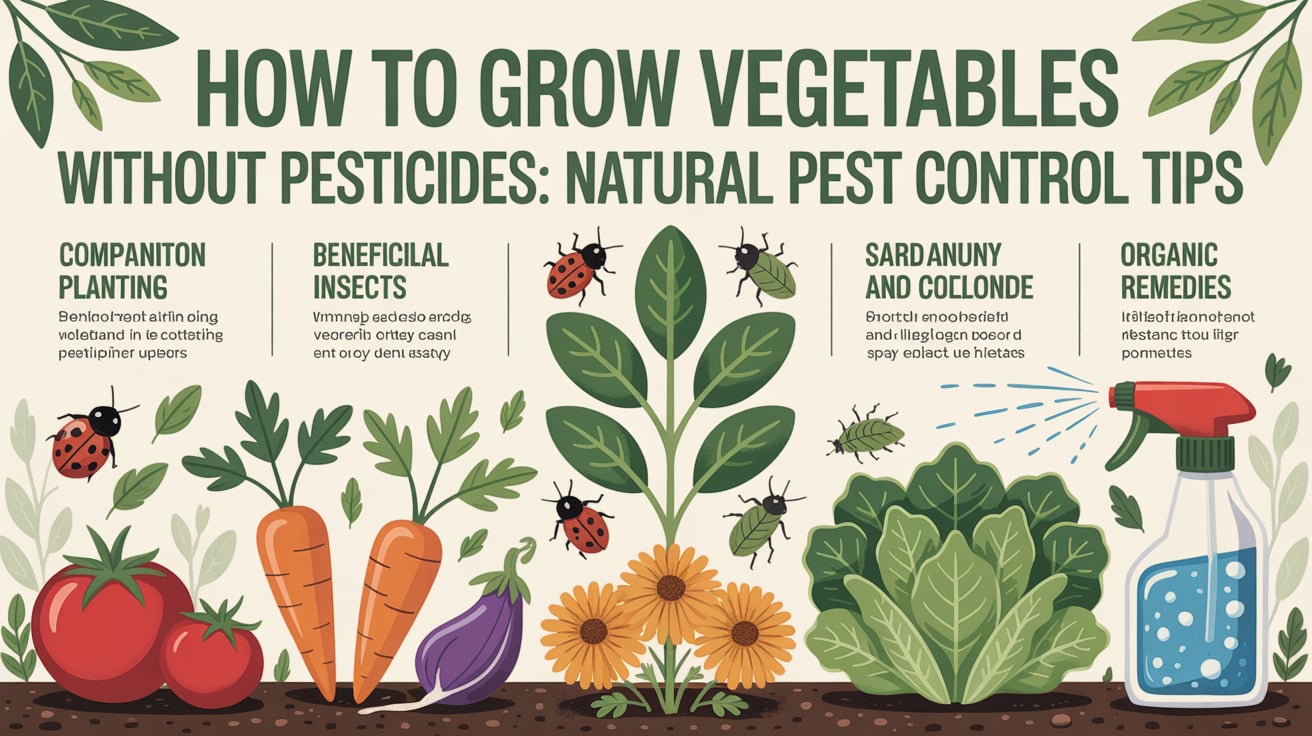
Conclusion: Grow Clean and Thrive Naturally
Growing vegetables without pesticides is achievable and rewarding. It protects health and supports the environment. With natural pest control tips, your garden becomes productive and resilient.
By using beneficial insects, companion planting and homemade sprays, pests are managed safely. Soil health improves and biodiversity flourishes. Whether you garden in containers or raised beds, these methods apply.

- Be Respectful
- Stay Relevant
- Stay Positive
- True Feedback
- Encourage Discussion
- Avoid Spamming
- No Fake News
- Don't Copy-Paste
- No Personal Attacks



- Be Respectful
- Stay Relevant
- Stay Positive
- True Feedback
- Encourage Discussion
- Avoid Spamming
- No Fake News
- Don't Copy-Paste
- No Personal Attacks

